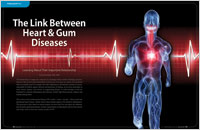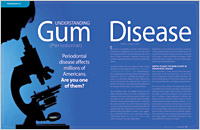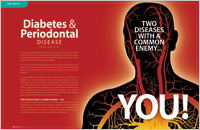Obviously, people aren't born with gum disease. So what exactly causes it, and how does gingivitis progress to periodontitis? Numerous factors play a role. The CDC estimates that fifty percent of Americans have periodontitis, so clearly there must be certain common factors.
1. My gums are fine… I think?
Unfortunately, the leading cause of periodontitis is a lack of dental hygiene. Frequently neglected teeth allow food into the gum line, which lets plaque build up. Bacteria can then proliferate, making the gums bleed profusely. Even the slight touch of a bristle or strand of floss can trigger a red gush. There may be pain. With a proper routine, you can reverse the damage, but ignoring the earliest signs can lead to other problems.
2. Do I have Gingivitis?
The gingiva, or gums, are soft pieces of flesh that bacteria love to nestle in. But the gingiva recede once they have collected too much debris and house too many bacteria. A dental probe will indicate how advanced (deep) the inflammation is. As the gums pull back, the bleeding intensifies, and the gum line slowly begins to expose other parts of the teeth. You may experience cold or heat sensitivities, too. Now here's the cool part: the final stage of gingivitis isn't gingivitis. It's periodontitis.
3. Things are worse than I thought.
Periodontitis starts off by loosening the attachment between the teeth and gum line. You'll still have a full set of pearly whites, but they'll increasingly recede downward, doubling any pain, bleeding, inflammation, and sensitivity. The disease continues to foster bacteria in the pockets of your gums, and as the pockets widen from the tissue decay, symptoms only grow worse.
4. This is terrible!
During the later stages of gum disease, the gums detach from the teeth. You might feel the teeth literally moving in place. Pockets grow deeper, and bacteria migrate to the trenches of your roots where they infect and inflame. Pain levels are drastically higher, and minor movements of the jaw can induce crippling anguish. Failure to treat this stage can lead to the last and final frontier.
5. What happened to my teeth?!
As the disease runs its course, the teeth decay and detachment takes place. Reversing the damage may be impossible because of bone and gum loss. Any remaining teeth will eventually come loose without intervention. Bacteria enter the bloodstream en masse, affecting organs like the heart. Plaque buildup in the arteries leads to atherosclerosis and subsequent heart failure.
Periodontitis causes a wide array of problems, which is why stopping the disease early is imperative. Daily flossing, brushing, and rinsing removes most of the dangerous plaque that accumulates in the gum line. Any bleeding or pain needs attention, and if symptoms remain after two weeks, schedule an appointment with your dentist. Ask about brushing and flossing techniques to improve gum health. Finally, don't panic. Most people have problems with their gums, but few advance to the last stage. Keep smiling!
Related Periodontal (Gum) Disease Articles
 The Link Between Heart & Gum Diseases
The Link Between Heart & Gum Diseases
Inflammation has emerged as a factor that is involved in the process of Cardiovascular Disease (CVD), which commonly results in heart attacks and strokes. While the precise role inflammation plays in causing chronic CVD remains an area of intense current investigation, much more is now known. The good news is that, based on current research, we know that if we can reduce the inflammation caused by periodontal disease, we can reduce the risk for heart attacks and strokes... Read Article
 Understanding Gum (Periodontal) Disease
Understanding Gum (Periodontal) Disease
Have your gums ever bled when you brushed or flossed? This most commonly overlooked simple sign may be the start of silent (periodontal) disease leading to tooth loss. Learn what you can do to prevent this problem and keep your teeth for life... Read Article
 Diabetes & Periodontal Disease
Diabetes & Periodontal Disease
Diabetes and periodontal disease are chronic inflammatory diseases that impact the health of millions of people. What you may not know is that diabetes and periodontal disease can adversely affect each other... Read Article
 Warning Signs of Periodontal (Gum) Disease
Warning Signs of Periodontal (Gum) Disease
This article provides the warning signs of periodontal (gum) disease. Don't wait until it's too late... Read Article


